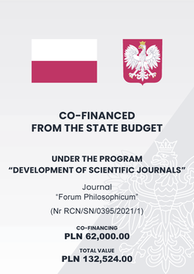History of Philosophy in Lithuania (I)
Abstract
The academic History of Philosophy in Lithuania in three volumes will be published by the Institute of Culture, Philosophy and Art. The first presented volume covers the development of Lithuanian philosophy from the 16th to the 18th centuries. It includes late medieval and Renaissance philosophy, the second scholasticism and modern philosophy. The first Lithuanians to be introduced to philosophy were young members of the gentry who studied in European universities at the end of the 14th century. The recently baptized Lithuania strove to adopt Western culture and to present itself as a Western state. Some graduated from the universities as bachelors or masters of philosophy and returned to their country. At the end of the 14th century, Vilnius Cathedral School was founded. The elements of logic were probably taught there. The growth of the political and economic power of the Grand Duchy
of Lithuania brought about the need for higher education. That need was significantly increased by the growing activity of various religious orders. In 1507 the Dominicans started teaching philosophy and theology
to their novices. They were able to teach late medieval philosophy in its thomistic interpretation. We can regard 1507 as the year Lithuania benefited form a new phenomenon, professional philosophy, and the Dominicans
as its initiators. They taught not only the disciplines of late medieval philosophy but also the basics of the other sciences. The Dominicans, and later the Jesuits, Franciscans, Bernardines, Carmelites, Trinitarians and other monastic orders, enriched intellectual life in Lithuania by teaching philosophy in their schools.
Keywords
Cite this article
Plečkaitis, Romanas. “The History of Philosophy in Lithuania (I).” Forum Philosophicum 10 (2005): 159–66. doi:10.35765/forphil.2005.1001.11.




